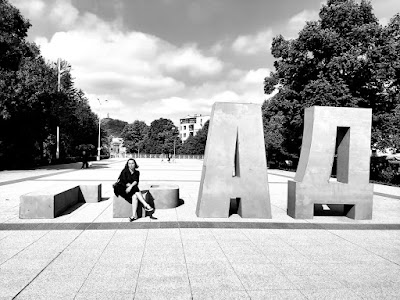Veronika Tzekova
"dySTOPia"
intervention-performance
and protest walk in public space
Plovdiv, Bulgaria
2022
Plovdiv, Bulgaria
2022
“dySTOPia” was realised as group short-term interventions-performances on “STOP” road signs along a predetermined route in the city centre. The participants, together with the artist an agent-provocateur (protest facilitator), walked a short route in the city and made interventions-performances in public space to protest and reflect on the dystopian aspects of society nowadays. The ephemeral interventions-performances were taking place on pre-selected “STOP” signs. Using two signs with the text “DY” and “IA” (see photos). Participants were briefly holding the signs “DY” and “IA” from the two sides of the “STOP” sign, so that the word “dystopia” was formed. At each of the stops was protested against a specific dystopian feature.
The idea was to draw attention to already existing or intensifying dystopian features in our contemporary society, economic system and world order.
Some political, social and environmental emergencies of our time that could be classified as dystopian (a dystopian society usually has at least one of the following characteristics from this non-exhaustive list):
- Fear; principle of fear in forms of government;
- Tyrannical governments;
- Environmental disasters;
- Division of society;
- Lack of social mobility;
- A high wealth gap;
- Fear or loathing of the world outside of one’s own state;
- Permanent/intensified surveillance and control by the state;
- Isolation of the natural (biological) environment from everyday life;
- Corruption;
- Strict conformism;
- Poverty;
- Diseases;
- Depression;
- Alienation of the individual from nature, the state, society, family and himself, etc.
The intervention-performance “dySTOPia”, although minimalistic and symbolic, protests and briefly occupies, but is not destructive, rather like any protest, it is a sign of a desire for change on the part of conscious individuals. A poetic and beautiful gesture of human beings who have left, albeit briefly, their comfort zone and the diabolical cycle of everyday life.






